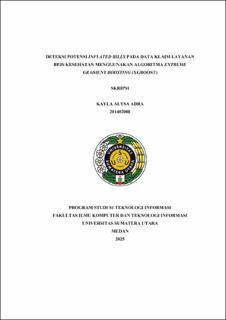| dc.description.abstract | Inflated bills or bills that exceed the actual cost are a common type of fraud happen in advanced referral health facilities in the implementation of BPJS Heath program. Such fraud can lead to financial losses for BPJS Health, trigger budget deficits, and disrupt the sustainability of the National Health Insurance (JKN) program. This study aims to develop a system that capable to automatically detecting potential inflated bills to prevent such budget deficits. the data used consists of a sample of health service claims in FKRTL from 2016 to 2022, comprising 1,176,438 rows. The data is divided into training, validation, and testing subsets with 25 variables selected based on the Indonesian Minister of Health Regulation No. 3 of 2023 about Healthcare Tariff Standards In The JKN Program. The parameter tuning process was conducted 48 times, testing the combination of n_estimators, learning_rate, and max_depth parameters. The best combination achieved was n_estimators at 100, learning_rate at 0.1, and max_depth at 8 with Mean Absolute Error (MAE) of 0.005 on the training data and 0.008 on the validation data. The testing results in this study indicate that the model achieved an MAE of 0.008, MSE of 0.015, and RMSE of 0.12 on the testing data. These values demonstrate that the model has a low error rate in predicting the verification costs and can be used as a tool for detecting potential inflated bills. | en_US |


